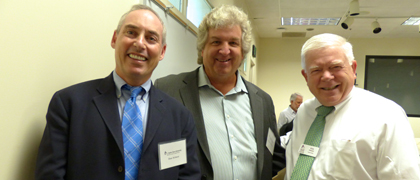
Dan Schnur, Rich Robinson, and Center Executive Director Kirk O. Hanson
What are the ethical issues in political campaigns? What roles do money and influence play in outcomes? How can high ethical standards be maintained and upheld before, during, and after campaigns? These were just a few of the issues raised during the Government Ethics Roundtable held November 15, 2013, at The Markkula Center for Applied Ethics, Santa Clara University. The panelists were: Rich Robinson, expert in strategic planning, public policy development, and government relations, and founder of Robinson Communications; and Dan Schnur, director of the Jesse M. Unruh Institute of Politics at the University of Southern California. Judy Nadler, Senior Fellow in Government Ethics and former mayor of the city of Santa Clara, moderated the panel.
The "rule of three" served as a theme for both presenters, each of whom outlined three central talking points, similar in concept but with different perspectives. "There are three things the public gets mad about," began Robinson, who served as northern California Director for Bill Clinton for President, and worked on Barack Obama for President, as well as the campaigns for Gary Hart, Alan Cranston, John Kerry, and Joe Biden. First, Dishonest Campaigns reflect the inherent ethical quandaries of politics: There are no regulations on the honesty of a campaign, or what is deemed appropriate or inappropriate. Robinson argued that a "negative campaign" is not necessarily a bad thing, if the accusations about the candidate are true, but he said that lying during campaigns has become commonplace, often with little distinction between fact and opinion, leading to misjudgments and misinformation among voters. And what about transparency? For example, if a candidate is running for a financial office, is it fair to demand the disclosure of his or her personal bankruptcy?
A second ethical dilemma in political campaigns is inconsistency, Robinson noted, emphasizing the importance of "cleaning house" for both Democrats and Republicans within their own parties and the unfortunate double standards that exist. He pointed out parallel scenarios in the cases of the sex scandals for Republican senator Bob Packwood, and later, Bill Clinton. "Many Democrats were quick to call for Packwood's resignation," Robinson said. "But when it happened with Bill Clinton, they were quiet." Political parties have to be willing to call out wrongdoing on the part of their own members, Robinson argued.
A third ethical quandary is the Role of Money in campaigns. Contrary to popular thought, money does not determine outcomes in elections, especially at the national level. We do not now have, for example, President Mitt Romney or Governor Meg Whitman. Money can play a role, however, in "down-ballot" races, and continually changing rules on contributions, expenditures, and reporting, can make almost any politician appear unethical at some point during his or her campaign.
Dan Schnur's trio of challenges to ethical conduct in political campaigns included: the influence of money in politics; lying and deception; and disenchantment among voters. Using as analogy the well-known myth of Icarus, whose flight too close to the sun led to his ultimate downfall, Schnur suggested that, essentially, power corrupts. And, the potential to behave unethically grows with stature and influence. "We've seen too much of this," he commented, referring to "candidates behaving in ways they never thought they would" when they started out as idealistic newcomers in public life.
On lying, Schnur asked and answered: "What motivates someone to lie about someone else? You lie about the enemy. The temptation to lie in politics comes from our hyper-partisanship." Shnur, who is also adjunct instructor at the University of California at Berkeley's Institute of Governmental Studies, drew from his "Future of California" class to illustrate the 40-yard line solution for public policy. The loudest voices are in the bleachers, he said, but the solutions need to be found in midfield. In an interesting commentary on how social media and other technologies are impacting the issue, Schnur held up his iPhone as both empowering and isolating. Technology, he said, is both social and anti social. Our ability to create the "Me network' through technology creates an echo chamber, he said, "and those who disagree with us suddenly become the enemy."
Regarding disenchantment among voters, Schnur pointed out that there is only a 9 percent favorability rating for Congress. The challenge is not only how to communicate to an electorate that doesn't trust politicians or finds them relevant, but also how to restore confidence when the bad actors of the political world get headlines, while countless hardworking and ethical public officials are overlooked.
A concluding discussion among members of the roundtable about potential solutions to these ethical dilemmas focused on a "power to the people" approach, such as a citizen watchdog or "credibility center" on the local level to determine minimum ethical standards.
Carrie Jaffe-Pickett is the assistant director of communications for the Markkula Center for Applied Ethics.
November 2013


